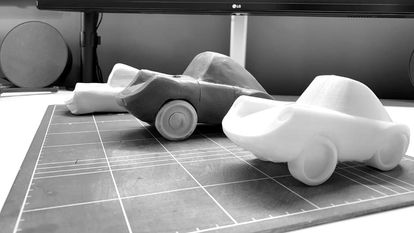
Emoticars
Thearpy Car Set

Project Motivation
Emoticars was a true passion project for me as
I was able to collaborate with my mother,
an art therapist, to create a new therapy tool.
Our aim was to create a tool for children therapist's
Our aim was to create a tool for children therapist'sthat evokes an emotional dialogue with young boys that often don't get excited about common therapy games.
Why a therapy toy?
Since children can’t adequately express
themselves in the adult world, the therapist joins the
child in their world, on their level.
As they play, the child may become less guarded
and more apt to share their feelings.
Most of the toys used by therapists today are 2D board games that often rely on the child's reading capabilities which are lacking at young ages.


By using a set of 3D vessels that communicate key emotions to children ages 4-7 the therapist will be able to create an motionally open conversation during the session.
Ideation Refrences
My own passion for cars & experience as a child in therapy
led me to design vessels of emotions as classic 1960's cars.
These vessels serve as an alternative to the board games & dolls
usually used in therapy with children.
.jpg)
2D Design Process
After I chose the key emotions, I conducted a sketch research of the visual cues for each emotion, such as expressions, human and animal postures at different emotional states. Those elements were later combined with the iconic car models from the 1960's.

3D Design Process
The Transition into 3D started with regular clay, after realizing it's not the right tool for the job. Working with Monster clay, for the first time, gave me much more freedom to understand the 3 dimensional forms and details I needed to figure out for 3D modeling.

Emoticars - Therapy Car Set
Intended for use during psychological therapy or art therapy.Each vehicle expresses emotion with its stance, face and color.
The goal is to use Emoticars as an ice breaker at the beginning of a session to evoke an emotionaldialogue with the patient.

Eductional Values
Emotion Processing: Emoticars can help process different emotional experiences in
a more protected way, allowing to discuss these issues without experiencing too much anxiety or discomfort.
Imagination Development: Role play is an important part of child development, as it builds confidence, creativity and problem solving. Being a fun activity, it also allows children to get into character and act out real situations from their life.
Improving Conversation Skill: role playing with emoticars can create an expansion of the emotional vocabulary and have a Significant impact on language development.
Social Skill Development: Emoticars allow for interactions between the characters which helps mimc and practice social skills and coping with different social situations.
User Study Video

The child had no problem recognizing the emotion of each emoticon. He was very excited to play with the cars instead of the previous games he played.
The therapist said the experiment was very successful, within a few minutes of play she could navigate the conversation into emotional situations that came up during role play.
After the cameras stopped rolling we tested Emoticars combined with different conventional therapy games like imagination dices and feeling boards.
Emoticars became integrated into the therapy session seamlessly.







